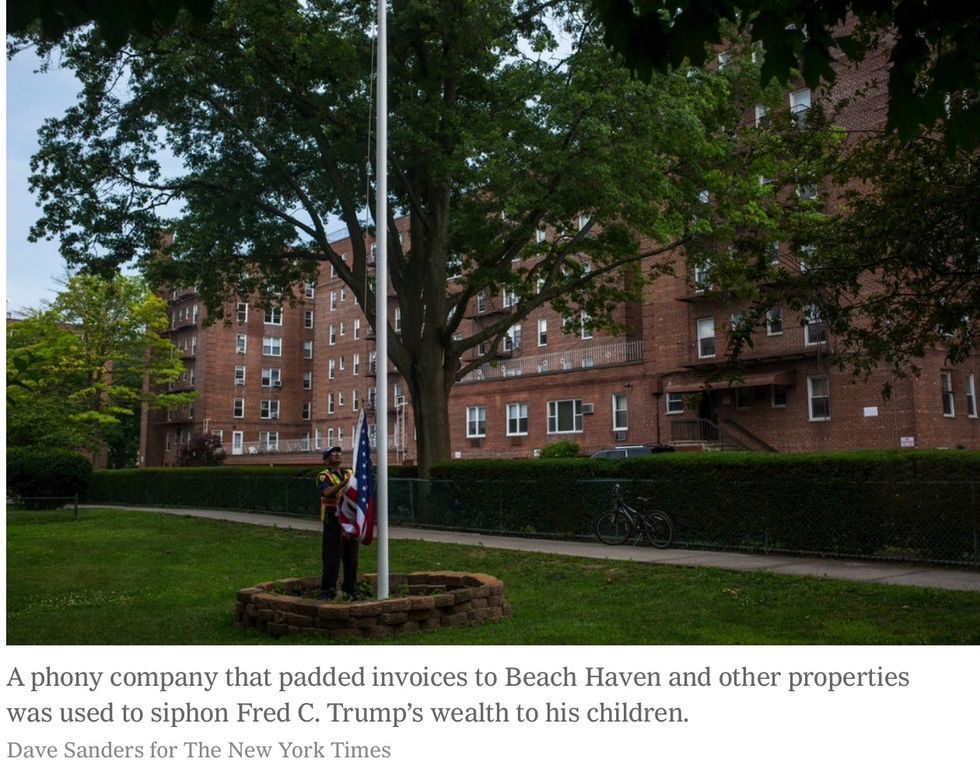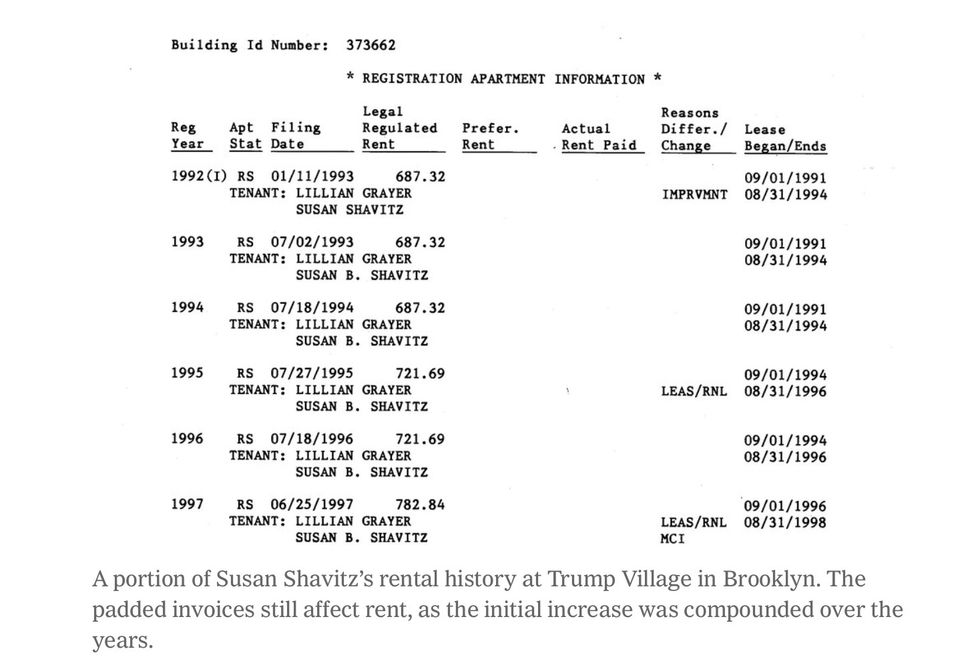They were collateral damage as Donald J. Trump and his siblings dodged inheritance taxes and gained control of their father's fortune: thousands of renters in an empire of unassuming red-brick buildings scattered across Brooklyn, Queens and Staten Island.
Those buildings have been home to generations of strivers, municipal workers and newly arrived immigrants. When their regulated rents started rising more quickly in the 1990s, many tenants had no idea why. Some heard that the Trump family had spent millions on building improvements, but they remained suspicious.
"I've always thought there was something strange going on," said Jack Leitner, who has lived in the Beach Haven Apartments in Coney Island, Brooklyn, for more than two decades. "But you have to have proof, and it's an uphill battle."
As it turned out, a hidden scam lurked behind the mysterious increases. In October, a New York Times investigation into the origins of Mr. Trump's wealth revealed, among its findings, that the future president and his siblings set up a phony business to pad the cost of nearly everything their father, the legendary builder Fred C. Trump, purchased for his buildings. The Trump children split that extra money.
[Read The New York Times's investigation here.]
Padding the invoices had a secondary benefit for the Trumps, allowing them to inflate rent increases on their father's rent-regulated apartments.
"The higher the markup would be, the higher the rent that might be charged," Robert Trump, the president's brother, once admitted in a sworn deposition obtained by The Times.
The president and his siblings have long since sold their father's buildings and moved on with their inherited fortunes. But for tenants, the insidious effects of the scheme continue to this day.
The padded invoices have been baked into the base rent used to calculate the annual percentage increase approved by the city. The sum total of the rent overcharges cannot be calculated from available records. As a way to appreciate the scope of the impact, a onetime $10 increase in 1995 on all the 8,000 apartments involved would put the total overpaid by tenants at more than $33 million to date, an analysis of approved rent increases shows.
Mr. Leitner, a retired computer programmer, was not pleased to learn that his rent had been artificially inflated. Like other tenants interviewed by The Times, he wants that money back.
"If they passed on phony costs to tenants, they should lower our rents," he said.
The Times's investigation of the Trump family's finances, based on a vast trove of tax returns and confidential financial records, found that Donald Trump, contrary to his lifelong claim of being a self-made billionaire, received the equivalent today of at least $413 million from his father.
That fortune was greatly increased by dubious schemes — including instances of outright fraud — designed to dodge gift and estate taxes, the investigation found. Mr. Trump was a central player in the formulation of those strategies, which included grossly undervaluing his father's apartment complexes in tax filings, interviews and records showed. He also received tens of millions of dollars in gifts from his father that were disguised as loans or business investments.
Mr. Trump and his brother Robert did not respond to requests for comment for this article. But in a written statement for The Times's original piece, one of the president's lawyers, Charles J. Harder, said that "there was no fraud or tax evasion by anyone," and that Mr. Trump had delegated tax matters to relatives and tax professionals.
The most overt fraud uncovered by The Times involved the sham corporation, All County Building Supply & Maintenance, created by the Trumps in 1992. It appeared, on paper at least, to be a purchasing agent for Fred Trump's buildings.
In reality, the creation of All County did not change how Fred Trump's business functioned. He and his executives continued to negotiate prices for everything from roofs to window cleaner, but vendors began receiving checks from an All County bank account. Fred Trump's apartment buildings then reimbursed All County, with an extra 20 to 50 percent tacked on.
All County was owned by Donald Trump, his three siblings and a cousin. In some years, the amounts distributed to each Trump sibling ballooned to nearly $1 million, records obtained by The Times show.
Because All County performed no real work, the transfer of money through the corporation was essentially a gift that evaded the 55 percent tax in place at the time, tax experts told The Times.
Former prosecutors told The Times that the filing of padded invoices with state rent regulators could have led to criminal charges at the time, but that the statute of limitations has long since expired. Civil penalties in cases of fraud remain a possibility, and tax authorities in New York City and New York State have said they are examining issues raised by The Times's investigation.
Lawyers who specialize in representing tenants say the Trumps' current and former tenants may have an opening to challenge the decades-old increases, potentially rolling back rents and collecting damages.
Michael Grinthal, supervising lawyer with the Community Development Project at the Urban Justice Center, a nonprofit legal services and advocacy group, said that the current owners would be held responsible for any damages, but that those owners could have a claim against the president and his siblings.
"If I was talking to those tenants right now, I'd say: 'Do it. Go,'" Mr. Grinthal said. "This case should be fought."
Regulations generally allow tenants to challenge rent for the past four years. But the state's highest court has held that tenants can look back further to show their landlord increased rent through fraud (though damages are still limited).
"If they are making false statements about how much it costs, that would be pretty much dead center of the definition of fraud," Mr. Grinthal said.
Although the state Division of Housing and Community Renewal oversees rent-regulated apartments, the responsibility for uncovering overcharges falls mostly to tenants, many of whom are unaware of the rules. Just trying to figure out the codes on rental history forms and discern what drove up their rent can seem daunting.
Susan Shavitz, 73, moved into her two-bedroom at Trump Village in Coney Island with her mother when Fred Trump completed construction in 1964. Decades later, her rent begin to rise more quickly. She believed at the time that the increases were exclusively because the Trumps had switched the building to a different affordable-housing program.
Ms. Shavitz obtained her apartment rental history from the state at the request of The Times, but she could not translate the soup of numbers and abbreviations.
"It made no sense to me whatsoever," said Ms. Shavitz, a retired teacher. "I have no idea how much of it was because of the improvements."
Other records show the state approved a building-wide rent increase in 1997 of almost $1.1 million after the Trumps installed new windows, terrace doors and boilers, which were an early focus of the All County purchases. That project increased Ms. Shavitz's rent by $32 a month. While it is not known how much of that is attributable to All County, the cost of improvements bumped up her rent in five of the last eight years that the Trumps owned the buildings, adding 11 percent in all.
Ms. Shavitz said that she was financially comfortable and could afford her rent but would still participate in a lawsuit to win back overcharges.
Like Ms. Shavitz and her mother, thousands of tenants once saw moving into a Fred Trump building as a step up the economic ladder, an arrival of sorts. In the postwar era, the president's father came to own more than 10,000 apartments in New York City, and thousands more elsewhere, often financing the construction through low-interest government loans aimed at creating affordable housing for returning veterans and the booming middle class.
The rules attached to those loans kept rents low, but Fred Trump excelled at keeping costs low, and the empire became enormously profitable. In just one six-year span, 1988 through 1993, Fred Trump reported $109.7 million in total income, the equivalent today of $210.7 million, according to confidential tax records obtained by The Times.
His buildings share a uniform austerity. Most are six-story brick rectangles with incongruously aristocratic sounding names — Saxony Hall, Westminster Apartments, Green Park Essex. His largest projects were sprawling complexes with acres of lawn in and around Coney Island — Beach Haven, Shore Haven and Trump Village.
The folk singer Woody Guthrie took an apartment at Beach Haven in 1950. He wrote a song called "Old Man Trump," contemplating the morality of paying rent to someone who would not allow blacks to live in the building. The chorus began:
Beach Haven ain't my home!
I just can't pay this rent!
My money's down the drain!
And my soul is badly bent!
Mr. Leitner, 69, remembers that when he signed his first lease at Beach Haven in 1996, the rent was significantly higher than the one quoted during his apartment hunt.
He recently obtained the official rental history of his apartment from the state at the request of The Times. It shows that his initial rent was $728, an increase of $154 from the prior tenant's rate. Most of that jump, in fact, was because of the improvement costs.
The effect of those costs was compounded through the years, as every approved rent increase built upon the starting point. And while some portion was certainly legitimate, even a $10-a-month increase because of a padded All County invoice would mean that Mr. Leitner had given his landlords at least $3,800 more than they were legally entitled to over the past 22 years.
Housing advocates have long argued that there is widespread abuse of the two programs that owners of rent-regulated apartments use to raise rents based on improvements or repairs. Two Albany lawmakers introduced legislation last August that would end one, known as Major Capital Improvements.
"The M.C.I. program has been subject to abuse by landlords for years — the fact the Trump family did it just highlights that," said one of the lawmakers, state Senator Michael N. Gianaris, a Queens Democrat. "It's time to scrap the program."
Because the increases carry forward, even tenants who moved in years after the Trumps sold the last of their father's empire in 2004 were affected by the family's invoice-padding scheme.
"I want it looked at because a lot of tenants may be owed money," said Angel Castillo, 49, who moved into Beach Haven a few years after the Trump siblings sold it.
He moved out just a few weeks ago. The reason: The current landlord increased his rent by $150 a month.
"They told me I was lucky it wasn't more," he said.
New York Times, December 15, 2018
###
December 16, 2018
Post Script. This is a simple account of how the Trumps cheated millions from taxpayers and their tenants in NYC. Wait until we tally up the DC dollars #OnceATrumpAlwaysATrump #OnceACheatAlwaysACheat



